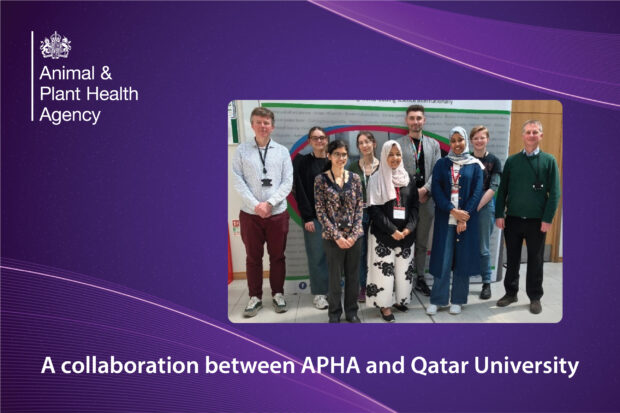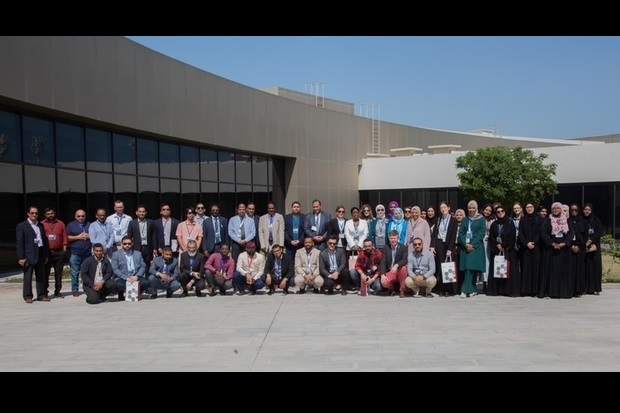
The bacteria known as Campylobacter are a common cause of food poisoning in people. The majority of Campylobacter infections are linked to the handling and consumption of chicken meat as chickens can carry the bug in their guts and faeces. The emergence of antimicrobial resistance (AMR) is also a threat to infected patients who require antibiotic treatment as there is a risk that these medications will no longer be effective. Therefore, research into AMR in Campylobacter that can be found on chicken meat is important to ensure food safety for the consumer.
In a world in which international trade and travel are so prevalent, it is crucial to address the issue of food-borne pathogens and the spread of AMR from a global perspective. In line with this, Animal and Plant Health Agency’s (APHA) collaboration with Qatar University aims to share expertise between bacteriology laboratories, support research to control the spread of AMR in food-borne pathogens and promote best practices to minimize consumer risks.

In 2022, the UK National Reference Laboratory for Campylobacter in Animals based at APHA Weybridge, began working with Dr Nahla Omer Eltai from the Biomedical Research Centre (BRC) at Qatar University initiated by discussions led by Dr Rod Card from APHA’s FAO Reference Centre for AMR.
This project was conceived to share expertise in detecting, identifying, and characterising Campylobacter, helping Qatari scientists to assess the burden of Campylobacter present in chicken meat consumed in Qatar and AMR. In January 2023, BRC scientist Miss Hana Adel Mohamed Abdelrahman visited APHA to learn laboratory methods and quality systems. A reciprocal visit by Dr Sandra Laborda Anadon and Mr James Coates followed to help implement the new methods at the BRC. These visits were supported by the Science & Innovation Network in Qatar of the Foreign, Commonwealth and Development Office (FCDO).
A scientific workshop was hosted by the BRC at Qatar University in 2024 entitled, “Campylobacter Foodborne Disease: Essentials and Advanced Hands-On Techniques”. It featured presentations from APHA scientists Dr Sandra Laborda Anadon, Dr John Rodgers and Mr Alistair Davies, along with experts from Qatar University, and other Qatari institutions. The sessions were moderated by Dr. Nahla Eltai. The environment, food-production, veterinary and medical sectors were all represented to ensure the discussions had a ‘One Health’ perspective. Over 60 highly engaged attendees joined the three-day event that included ‘hands-on’ demonstrations.

In May 2024, Dr Eltai and Miss Abdelrahman from the BRC returned to the APHA to review the collaboration on Campylobacter and to deepen the knowledge exchange in bioinformatics.

Hana’s experience visiting APHA Weybridge
“It was an incredibly grateful experience to be the first link in the established cooperation that brought together Qatar University, and APHA.
During my visit at APHA, I had the chance to gain more knowledge about the different research areas conducted at the agency. I also learned more about the different identification methods of Campylobacter species and its antibiotic resistance in retail chicken meat. In addition, bioinformatic specialists at APHA helped me with a few concerns about DNA analysis and I had the chance to present some of my work testing air quality in Qatar.
For me, it was a unique, unforgettable experience being in the UK for the first time, and I hope this will extend to future collaboration in different research aspects.”
Sandra’s experience visiting Qatar University

“The experience of visiting Qatar during the collaboration with Qatar University was certainly unique and enriching.
During our visit, we had the opportunity to learn more about the research carried out at Qatar University and talk about our work at APHA as a National Reference Laboratory for Campylobacter in animals. It was a fantastic experience, and we are looking forward to future collaborations with Qatar University.
Finally, we would like to thank the British Embassy in Qatar for their support, funding through the UK Government’s Gulf Strategy and Qatar University IRCC grant number (QU-BRC-IRCC-24/25-394). Funds that made this collaboration possible.”

Recent Comments